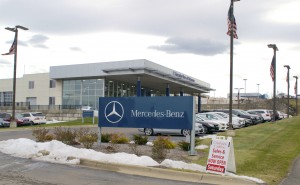
The Federal Reserve is expected to raise interest rates at least twice this year, but the impact on auto sales is unclear.
With automakers searching for a way to re-invigorate new vehicle sales, news that interest rates may be on the rise is the last thing that they want to hear, but another increase by the Federal Reserve appears to be on its way.
The Federal Reserve raised the interest rate three times last year. The last hike move the rate from 1.25 to 1.5%. Early indications are that the Fed will raise that rate at least two times this year, and possibly four as it looks to head off inflation concerns.
While that doesn’t seem like much, those increases could trickle down to car buyers. The hikes may force automakers to stop subsidizing ultra-low loan terms to entice buyers with good credit to continue buying new vehicles.
In the 12 months leading up to January, the average interest rate for a 60-month new-car loan was relatively stable, rising from 4.35% to 4.51%, according to Statista.com. The result on the average new vehicle, which was $34,968, was an increased payment from $688 to $691, according to Kelley Blue Book.
It seems like a minor issue, just $3 a month, but there is a cumulative effect.
(Automotive consumer debt continues to rise. Click Here to see why.)
“If you look at it on an increase basis, each quarter-percent increase is a very small amount,” said Charles Chesbrough, senior economist and senior director of industry insights for automotive marketing company Cox Automotive. “But four increases, that’s a full base-point. That starts to adding up to real money for some people.”
The increase doesn’t just mean an increase in auto payments, but other areas too, such as credit cards, he noted, adding this could impact the amount of money available for the car payment.
“When interest rates go up, credit cards go up immediately,” he said. “That’s money that’s coming out of the pocket of consumers. It could impact manufacturers if it becomes a little bit more expensive to offer the incentives they were doing before.”
(Click Here for more about automaker concerns for 2018 sales after a slow December.)
However, there is information that suggests that consumers are still feeling good about the economy and that good feeling comes despite an acknowledgement that interest rates may rise.
Consumers seem confident about their personal economic prospects and the amount of automotive-related debt is expected to increase this year, meaning buyers are comfortable paying a little more for a vehicle due to the higher interest rates.
The Federal Reserve Bank of New York’s Center for Microeconomic Data said the January 2018 Survey of Consumer Expectations showed continued improvement in expectations about households’ year-ahead financial situation and credit availability as well as earnings growth. Short- and medium-term inflation expectations also fell slightly.
(To see why some think auto ownership may have passed its peak, Click Here.)
Perceptions of the household’s financial situation compared to a year ago, as well as one-year-ahead expectations of the household’s financial situation both improved and reached new series’ highs, with 38.7% of respondents feeling they are better off and 45.7% expecting to be better off financially, compared to 37.0% and 43.2% in December respectively.

